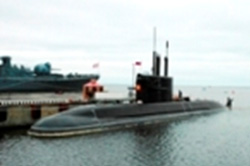Sep 2 2010
Speakers made from carbon nanotube sheets that are a fraction of the width of a human hair can both generate sound and cancel out noise -- properties ideal for submarine sonar to probe the ocean depths and make subs invisible to enemies. That's the topic of a report on these "nanotube speakers," which appears in ACS' Nano Letters, a monthly journal.
Ali Aliev and colleagues explain that thin films of nanotubes can generate sound waves via a thermoacoustic effect. Every time that an electrical pulse passes through the microscopic layer of carbon tubes, the air around them heats up and creates a sound wave.

Chinese scientists first discovered that effect in 2008, and applied it in building flexible speakers. In a remarkable demonstration, which made its way onto YouTube, the Chinese nanoscientists stuck a sheet of nanotubes onto the side of a flag, and attached it to an mp3 player. They used the nanotube-coated flag to play a song while it flapped in the breeze. But they did not test its ability to operate under water.
Aliev's group took that step, showing that nanotube sheets produce the kind of low-frequency sound waves that enable sonar to determine the location, depth, and speed of underwater objects. They also verified that the speakers can be tuned to specific frequencies to cancel out noise, such as the sound of a submarine moving through the depths.